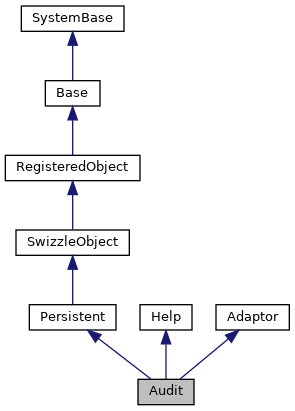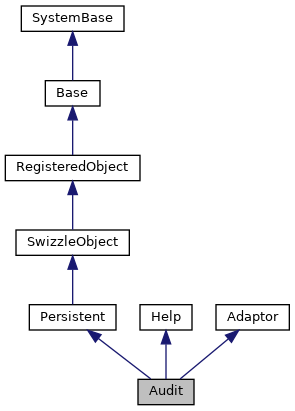The auditing system allows the user to capture events which occur on the system, and log them to an audit file. More...


Public Attributes | |
| AuditIndex | |
| More... | |
| Authentication | |
| Authentication method process used. More... | |
| CSPSessionID | |
| Session ID of the process if a CSP process. More... | |
| ClientExecutableName | |
| Executable name on the client machine. More... | |
| ClientIPAddress | |
| IP address of the client, as passed from client. More... | |
| Description | |
| Description of the audit event. More... | |
| Event | |
| Name of the audit event. More... | |
| EventData | |
| EventData – arbitrary data associated with this event. More... | |
| EventSource | |
| Event Source (system events all have "%System" here). More... | |
| EventType | |
| EventType. More... | |
| GroupName | |
| Group of the audit event. More... | |
| JobId | |
| Job ID. More... | |
| JobNumber | |
| Job Number. More... | |
| Namespace | |
| Namespace process was executing in. More... | |
| OSUsername | |
| Operating system username of process. More... | |
| Pid | |
| Process ID. More... | |
| Roles | |
| $ROLES value that was active when the audit event occurred. More... | |
| RoutineSpec | |
| Routine running including DB and System. More... | |
| StartupClientIPAddress | |
| IP address of the client, as detected on the TCP channel by the server process. More... | |
| Status | |
| Any Status variable passed into the call. More... | |
| SystemID | |
| SystemName:ConfigurationName of where the event was generated. More... | |
| UTCTimeStamp | |
| UTC $ZTIMESTAMP value when the audit event occurred. More... | |
| UserInfo | |
| User info field. More... | |
| Username | |
| Username from $Username that was active when audit event occurred. More... | |
The auditing system allows the user to capture events which occur on the system, and log them to an audit file.
When running SQL queries on the audit log, it is helpful to use the UTCTimestamp in the WHERE clause to speed up the query, and minimize the amount of data which is returned. For example:
SELECT SystemID,AuditIndex,UTCTimeStamp,EventSource,EventType,Event,Pid,CSPSessionID,Username,Description<br> FROM %SYS.Audit<br> WHERE UTCTimeStamp BETWEEN :UTCBeginDateTime AND :UTCEndDateTime<br> ORDER BY UTCTimeStamp DESC, SystemID DESC, AuditIndex DESC<br> <br> The UTCTimeStamp is the UTC time in ODBC format. To convert a local $H time to this format use the following:<br><br> s x=##Class(%SYS.Audit).ConvertLocalHToUTC($H) <br> The UTCTimeStamp which is returned as part of the record, can be converted to local time with the following:<br><br> s x=##Class(%SYS.Audit).ConvertUTCToLocal(UTCTimeStamp)<br><br>
Access to all the audit class methods require the Admin_Secure:"Use" privilege.
If you wish to modify an audit record, use the Modify() class method. If you wish to modify it using direct object you must first use the OpenAuditRecord() class method and then the Save() method. Note that saving the object in this way also requires that the user have write access to the Audit database resource.
|
static |
Converts Audit records to the current IRIS format.
This is called before any of the Audit methods runs and also during an upgrade to make sure that the audit global is in the current format.
It will also check if there are any audit records in Cache' format (stored in the ^CacheAuditD global) and merge those globals into the current IRIS audit global.
Note that journaling is turned off for the process during the conversion.
Parameters:
Count (byref) - Returned count of number of audit records converted.
0 - Version already matches.
Requires Admin_Secure:"Use" privilege.
|
static |
Convert the local $H time to an ODBC format string in UTC.
When using SQL, use this function to convert a local time in $h to UTC time to use in your SELECT statement.
|
static |
Convert a UTCTimeStamp in ODBC format to Local Time in ODBC format.
|
static |
Copy matching audit records to a defined namespace.
Parameters:
BeginDateTime - $zdatetime($H,3) value of the first audit record to copy, "" = first record
EndDateTime - $zdatetime($H,3) value of the Last audit record to copy, "" = Last record
The following parameters may be specified as a comma separated list as follows:
"*" - All records match
"String,String1" - Any records matching one of these elements
"String*" - Any record starting with "String"
"String,String1*,String2" - Any record matching one of these elements, or starting with "String1"
Note that these are all case insensitive matches
EventSources - Comma separated list of valid event sources
EventTypes - Comma separated list of valid event types
Events - Comma separated list of event names
Usernames - Comma separated list of user names
SystemIDs - Comma separated list of System:Config names
Namespace - Valid namespace to copy audit records to
Flags - Bit 0 - Delete audit record after copy
Return values:
NumCopied (byref) - Number of audit records copied
Requires Admin_Secure:"Use" privilege.
|
static |
Delete matching audit records.
Parameters:
BeginDateTime - $zdatetime($H,3) value of the first audit record to delete, use "" to begin with the first record
EndDateTime - $zdatetime($H,3) value of the Last audit record to delete. Audit records will be deleted up through, but not including, this value. Use "" to delete through last record
The following parameters may be specified as a comma separated list as follows:
"*" - All records match
"String,String1" - Any records matching one of these elements
"String*" - Any record starting with "String"
"String,String1*,String2" - Any record matching one of these elements, or starting with "String1"
Note that these are all case insensitive matches
EventSources - Comma separated list of valid event sources
EventTypes - Comma separated list of valid event types
Events - Comma separated list of event names
Usernames - Comma separated list of user names
SystemIDs - Comma separated list of System:Config names
Return values:
NumDeleted (byref) - Number of audit records deleted
Requires Admin_Secure:"Use" privilege.
|
static |
Erase the audit file.
Flags: 0 - Erase all contents
1 - Erase and create new audit file
2 - Erase and create new audit file, treat as encryption state changed
Note that bit 1 infers that ALL data in the audit database will be deleted, not just Audit data
Requires Admin_Secure:"Use" privilege.
|
static |
Audit record exists.
This method checks for the existence of an Audit record in the security database.
Parameters:
UTCTimeStamp - UTC timestamp of the audit record
SystemID - System ID of the audit event, usually NODE:CFGNAME
AuditIndex - Index number of the audit record
Return values:
If Value of the method = 0 (Audit record does not exist, or some error occured)
Audit = Null
Status = Audit "x" does not exist, or other error message<br>
If Value of the method = 1 (Audit record exists)
Audit = Object handle to Audit record
Requires Admin_Secure:"Use" privilege.
If you wish to modify the returned object, use the Modify() method.
|
static |
Export matching records to an xml file.
Parameters:
FileName - Valid filename to copy audit records to
Flags - Bit 0 - Delete audit record after export
BeginDateTime - $zdatetime($H,3) value of the first audit record to copy, "" = first record
EndDateTime - $zdatetime($H,3) value of the Last audit record to copy, "" = Last record
The following parameters may be specified as a comma separated list as follows:
"*" - All records match
"String,String1" - Any records matching one of these elements
"String*" - Any record starting with "String"
"String,String1*,String2" - Any record matching one of these elements, or starting with "String1"
Note that these are all case insensitive matches
EventSources - Comma separated list of valid event sources
EventTypes - Comma separated list of valid event types
Events - Comma separated list of event names
Usernames - Comma separated list of user names
SystemIDs - Comma separated list of System:Config names
Username - Comma separated list of user names to copy, "*" = All
Return values:
NumCopied (byref) - Number of audit records exported.
Note: Two audit record will get written out when this is called in case the first one is deleted as part of the export operation.
Requires Admin_Secure:"Use" privilege.
|
static |
Get the Audit properties.
Parameters:
SystemID - System ID of the audit event, usually NODE:CFGNAME
AuditIndex - Index number of the audit record
Return values:
Properties - Array of properties
Properties("AuditIndex")
Properties("ClientExecutableName")
Properties("ClientIPAddress")
Properties("CSPSessionID")
Properties("Description")
Properties("Event")
Properties("EventData")
Properties("EventSource")
Properties("EventType")
Properties("JobId")
Properties("Namespace")
Properties("Pid")
Properties("Roles")
Properties("RoutineSpec")
Properties("StartupClientIPAddress")
Properties("SystemID")
Properties("Username")
Properties("UTCTimeStamp")
Requires Admin_Secure:"Use" privilege.
|
static |
Import audit records from an xml file.
Parameters:
FileName - Valid filename to import audit records from
NumImported (byref) - Returns number of records imported
Flags - Control import
Bit 0 - Do not import records, just return count
Note: On failure, no records will be imported
Audit records may not be imported into the SYS namespace
Requires Admin_Secure:"Use" privilege.
|
static |
Modify an Audit record's properties.
Modifies an Audit records properties from the security database.
Parameters:
UTCTimeStamp - UTC timestamp of the audit record
SystemID - System ID of the audit event, usually NODE:CFGNAME
AuditIndex - Index number of the audit record
See the Get() method for a description of the Properties parameter.
If a specific property is not passed in the properties array, the value is not modified.
Requires Admin_Secure:"Use" privilege.
|
static |
| AuditIndex |
| Authentication |
Authentication method process used.
| CSPSessionID |
Session ID of the process if a CSP process.
| ClientExecutableName |
Executable name on the client machine.
| ClientIPAddress |
IP address of the client, as passed from client.
This corresponds to the ClientIPAddress in SYS.ProcessQuery.
| Description |
Description of the audit event.
Control characters less than $c(32) are not allowed in this data except for CR,LF, and tab.
| Event |
Name of the audit event.
| EventData |
EventData – arbitrary data associated with this event.
Control characters less than $c(32) are not allowed in this data except for CR,LF, and tab.
| EventSource |
Event Source (system events all have "%System" here).
| EventType |
EventType.
| GroupName |
Group of the audit event.
| JobId |
Job ID.
| JobNumber |
Job Number.
| OSUsername |
Operating system username of process.
Username given to the process by the operating system when the process is created. When displayed, it is truncated to 16 characters. Note that the real O/S username is only returned when connecting to UNIX or VMS systems; For Windows, it will return the O/S username for a console process, but for telnet it will return the $USERNAME of the process. For client connections, it contains the O/S username of the client.
| Pid |
Process ID.
Note that on VMS system, the Hex pid is stored internally as a decimal value, i.e. $zh(pid).
| Roles |
$ROLES value that was active when the audit event occurred.
| RoutineSpec |
Routine running including DB and System.
| StartupClientIPAddress |
IP address of the client, as detected on the TCP channel by the server process.
This corresponds to the StartupClientIPAddress in SYS.ProcessQuery.
| Status |
Any Status variable passed into the call.
| SystemID |
SystemName:ConfigurationName of where the event was generated.
This is useful when merging separate audit streams from different systems.
| UTCTimeStamp |
UTC $ZTIMESTAMP value when the audit event occurred.
| UserInfo |
User info field.
| Username |
Username from $Username that was active when audit event occurred.